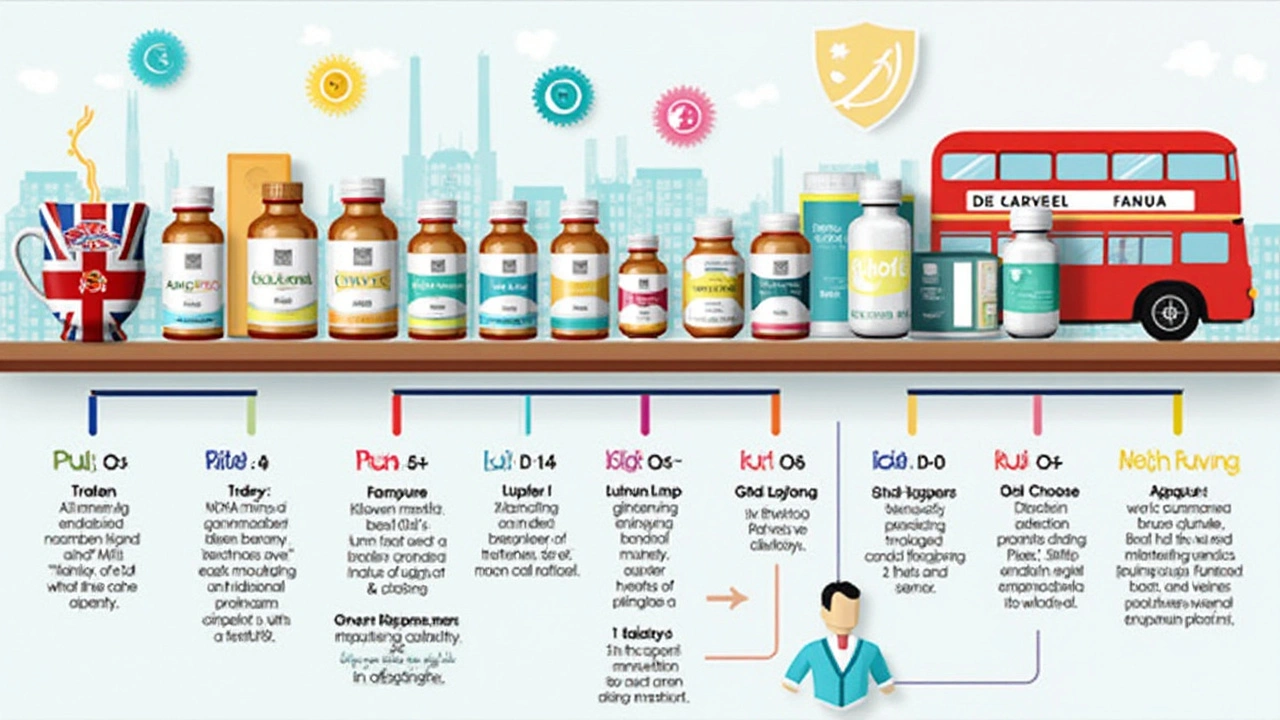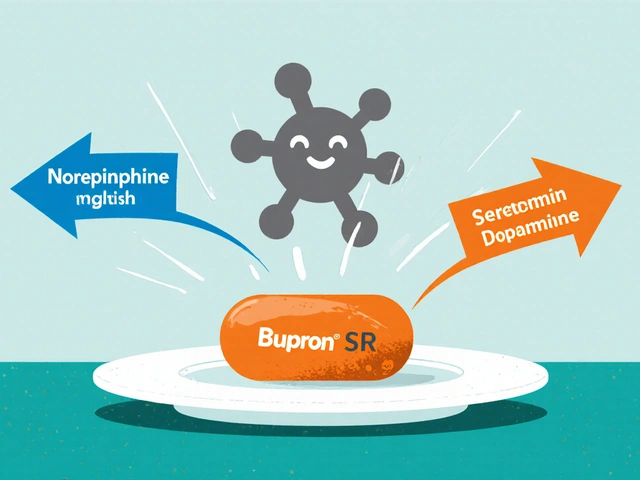
Ever grabbed a diphenhydramine tablet for a runny nose or a tough night’s sleep, only to wake up feeling groggy—and not in a good way? You’re not the only one. Diphenhydramine, commonly known as Benadryl in pharmacies everywhere, gets the job done but carries a real punch in terms of drowsiness and next-day hangover.
If you’re hunting for options that keep your allergies or sleep in check, but don’t leave you feeling like you’ve been hit by a truck, you’re in the right place. This isn’t just a basic list. We’ll dig into the strengths, downsides, and unique features of each alternative. Whether you get hives every spring, struggle to sleep after late-night snacks, or you’re just tired of feeling fuzzy-brained, here are real choices that might fit your needs—minus the classic Benadryl zombie mode.
Let’s check out what’s out there and see which antihistamines and sleep aids actually measure up. Some work fast, others last longer, and a few barely touch your energy level. You’ll find smart tips, fast facts, and plenty of real-world info, so you can actually decide what’s worth tossing into your medicine cabinet.
- Levocetirizine (Generic)
- Cetirizine
- Loratadine
- Fexofenadine
- Chlorpheniramine
- Doxylamine
- Hydroxyzine
- Desloratadine
- Rupatadine
- Promethazine
- Comparison Table
Levocetirizine (Generic)
Levocetirizine is basically the generic version of Xyzal, and it’s become a top pick for allergy relief without the drug hangover you get from Diphenhydramine alternatives like Benadryl. Doctors like to reach for it when patients get stubborn chronic hives or need solid allergy coverage that doesn’t knock them out cold. Its claim to fame? It’s fast—most folks notice symptom relief within an hour, and the benefits actually stick around for a full 24 hours. That alone makes it a serious option if you hate taking pills all day.
Fun fact: Research shows levocetirizine significantly reduces sneezing, itching, and runny nose scores in allergy sufferers, sometimes better than cetirizine (which is already a heavy hitter in the antihistamine world). It’s safe enough for daily use in adults and even kids (down to about 6 months for liquid forms), which makes life easier for parents dealing with constant sniffles.
Pros
- Long-lasting effect (up to 24 hours with one dose)
- Lower chance of sedation for most users compared to diphenhydramine—people usually stay alert
- Affordable because it’s available as a generic, so you get the same punch for less cash
- Great for chronic hives and year-round allergies, not just quick fixes
- Widely studied in kids, adults, and older people—with safety in mind
Cons
- Some sensitive folks still feel sleepy, though way less than with Benadryl
- Not perfect for elderly people—doctors recommend lower doses due to slower metabolism
- Avoid if you have severe kidney issues, since the drug leaves your system through the kidneys
- Rarely, can cause dry mouth or mild headache
If you’re comparing Levocetirizine head-to-head with other allergy relief options, it often wins for duration and fewer side effects, especially if you’re living with year-round symptoms or want something low-fuss. And if you’re tired of running through tissues or fighting off that medicated haze, it could be the game changer you’re after.
Cetirizine
If you’ve ever taken Zyrtec, then you’re familiar with cetirizine. It’s one of the go-to Diphenhydramine alternatives when you want strong allergy relief without feeling completely wiped out. Doctors recommend it all the time for seasonal allergies, especially when sneezing and itchy eyes are your main nuisance.
What sets cetirizine apart? It works fast, usually within an hour, and sticks around for 24 hours—so you don’t have to remember a midday dose if you’re headed out. It’s considered a “second-generation” antihistamine, which means it’s a lot less likely than Benadryl to knock you out. Still, a small share of people (around 10%) do get some drowsiness, so don’t be surprised if it makes you a bit sleepy, especially at first.
Cetirizine is safe for kids, adults, and even older folks, but everyone’s a little different. It’s available over-the-counter (no prescription drama), comes as tablets, chewables, and liquid, and it’s usually pretty affordable—even the big brands have generics right next to them.
Here’s what allergy experts say about it:
“Cetirizine is one of the most widely used antihistamines worldwide, effective for rapid symptom relief and well-tolerated by most age groups.” —American Academy of Allergy, Asthma & Immunology
Pros
- Works in as little as 1 hour and lasts up to 24 hours
- Non-prescription, easy to find
- Less drowsiness than first-generation antihistamines like Diphenhydramine
- Kinder on your alertness for daily activities and driving
- Safe for kids as young as 6 months in some cases
Cons
- Still causes drowsiness in up to 1 in 10 people
- Can cause dry mouth or headache
- Not always the best for severe hives or chronic itching compared to some prescription options
If you’re comparing, check out this quick data on how drowsy you might feel between common antihistamines:
| Antihistamine | Drowsiness Rate (%) |
|---|---|
| Diphenhydramine | up to 40% |
| Cetirizine | ~10% |
| Loratadine | <5% |
Cetirizine sits in a sweet spot for most people—fast, long-lasting, and much easier on your brain than Benadryl. If allergies are wrecking your day, it’s absolutely worth a try.
Loratadine
Loratadine is a big player in the Diphenhydramine alternatives world. You’ll probably recognize it on pharmacy shelves as Claritin. It’s an antihistamine made for allergy relief—think sneezing, itchy eyes, and runny noses—with barely any drowsiness. This makes it a top pick for people who need to function during the day, like parents wrangling kids or anyone who can’t afford a nap in the middle of the afternoon.
Loratadine starts working within one to three hours, which isn’t the fastest, but it covers you for a solid 24 hours. That bedtime drowsiness? It’s almost non-existent, so you won’t wake up in a fog. Most folks use it for hay fever, seasonal allergies, or mild hives. It’s even safe enough that it’s approved for use in kids as young as two years old.
Pros
- Low risk of drowsiness—keep your brain sharp at work or school
- Long-lasting effect, just one dose per day
- Available over-the-counter (OTC) almost everywhere
- Rarely interferes with other meds or conditions
Cons
- May not help with severe itching or strong allergic reactions
- Can be less effective if you’re struggling with nasal congestion
- Not a sleep aid—zero help if you actually want drowsiness at bedtime
For allergy symptoms but not for insomnia, Loratadine is an easy win. By the way, sales data shows Loratadine consistently ranks among the top three non-drowsy antihistamines in the U.S. each year, with millions choosing it as their go-to option for everyday allergy relief.
Fexofenadine
Fexofenadine, found on drugstore shelves as Allegra, has become the go-to antihistamine for people who want serious allergy relief without feeling sleepy or disconnected. It's often said to be one of the least sedating options, making it perfect if you need to stay sharp at work or school. If you ever tried diphenhydramine and couldn't keep your eyes open, fexofenadine is like a breath of fresh air—no groggy mornings.
This medication works by blocking histamine, the troublemaker chemical in your body that kicks off sneezing, runny nose, itchy eyes, and other common allergy symptoms. What I really like is that it comes in both adult and kid-friendly versions and you can buy it over the counter, so no prescription is needed for most folks.
Interesting stat: In a major 2023 study comparing common antihistamines for seasonal allergies, patients taking fexofenadine reported drowsiness less than 1% of the time, compared to over 20% for those taking diphenhydramine.
Pros
- Minimal drowsiness—it's a “non-drowsy” option for a reason
- Long-lasting relief with just one or two doses a day
- Safe for daily use, even for drivers and machine operators
- Low risk of heart side effects at usual allergy doses
Cons
- Doesn't help much with insomnia (unlike diphenhydramine)
- Sometimes less effective for severe hives or itching
- Can interact with some antacids or fruit juices (like grapefruit, apple, or orange), which might lower its absorption
- Usually costs a bit more than basic generic antihistamines
Fexofenadine is probably the closest thing to a 'clear-headed' Diphenhydramine alternative you'll find, especially if you need to get through a busy day or operate your car without foggy-brain side effects.
Chlorpheniramine
If you want an older, tried-and-true allergy fighter, chlorpheniramine deserves a look. This one’s been around for decades—your parents probably had it in their medicine cabinets back in the day. It's a first-generation antihistamine, commonly found in over-the-counter allergy and cold medicines. Chlorpheniramine tackles classic symptoms like sneezing, itchy nose, watery eyes, and runny nose, especially during allergy season.
What sets it apart? It’s known for causing less drowsiness than diphenhydramine, but it can still knock you out if you’re sensitive. It usually kicks in within an hour and can last four to six hours, making it pretty handy for quick, spot-treatment of allergy flare-ups. It’s also sometimes used in combo with cold meds, which you’ll notice if you peer at the back of those neon-colored cold tablets.
“Chlorpheniramine is often favored for day-time use compared to other first-generation antihistamines, since it tends to cause less sedation in most people,” says the American Academy of Allergy, Asthma & Immunology.
But that’s not a free pass—this stuff can still cause sleepiness, dry mouth, and even constipation if you take it too often. And if you’re older, it might mess with your memory or focus, so caregivers usually steer seniors towards something gentler. Popular brands include Chlor-Trimeton and several generics, so you won’t have trouble finding it at the drugstore.
Pros
- Quick relief from allergies and hay fever symptoms
- Less sedating than diphenhydramine for most people
- Cheap and easy to find (over-the-counter)
- Can be taken as needed instead of every day
Cons
- Can still cause drowsiness, just less than Benadryl
- Shorter action (needs dosing every 4-6 hours)
- Not great for daily allergies due to side effects with long-term use
- Can affect memory and clarity, especially for older adults
| Onset | Duration | Common Side Effects |
|---|---|---|
| 30-60 mins | 4-6 hours | Drowsiness, dry mouth, constipation |
Bottom line: For quick, affordable allergy symptom control, chlorpheniramine is still hanging on after all these years—but just be mindful if you need to drive, work, or stay sharp during the day. If you have issues with diphenhydramine alternatives that hit too hard, this is a middle ground worth trying.

Doxylamine
If you’ve checked the label on most over-the-counter sleep aids lately, there’s a good chance you’ve spotted Doxylamine. It shows up prominently in brands like Unisom SleepTabs and is actually a first-generation antihistamine, just like Diphenhydramine. But when it comes to helping you zonk out, doxylamine can be even stronger, which is why doctors and pharmacists still mention it for major sleep troubles.
Doxylamine is also used for cold and allergy symptoms, like sneezing and runny nose. Some people even rely on it for a quick fix during allergy season, but its reputation mostly comes from its heavy-duty effect on knocking people out at bedtime. It works by blocking histamine receptors in your brain, which means you get relief from both allergies and a built-in sleepy side effect. Unlike some newer allergy meds, doxylamine doesn’t pull any punches when it comes to sedation.
If you’re considering switching from Diphenhydramine, here’s what you need to weigh:
Pros
- Super effective for sleep—if Benadryl leaves you awake at night, doxylamine might actually do the trick.
- Works fast; usually kicks in within 30 minutes.
- Widely available without a prescription and pretty affordable.
- Can provide solid relief for allergy symptoms, especially sneezing and runny nose.
Cons
- Major drowsiness. For some, it’s actually stronger than Diphenhydramine, increasing risk for morning grogginess or mental “fogginess.”
- Can dry you out—a lot. Think dry mouth, dry eyes, plus possible constipation.
- Longer-lasting in your body than diphenhydramine, so that hangover feeling can stick around well into the next day.
- Shouldn’t be used by older adults because of a higher risk of confusion, falls, and other nasty side effects.
- Can interact with other medications, especially those that also depress the central nervous system.
Fun fact: A 2022 pharmacy survey found that nearly 1 in 4 people who used doxylamine as a sleep aid said they “overslept” or struggled to feel alert for morning tasks like driving to work or making coffee. That’s a reminder—if you’re sensitive to sedating meds or you need to be up early, this one deserves caution.
Hydroxyzine
Hydroxyzine is a workhorse if you’re dealing with strong allergies or anxiety, and it’s often suggested as a step up from diphenhydramine alternatives for both kids and adults. It’s used under two main brand names: Atarax (for allergy relief and itching) and Vistaril (for anxiety and sleep). This medicine is prescription-only, so you won’t stumble on it at your local drugstore aisles without a doctor’s note.
Unlike over-the-counter antihistamines, hydroxyzine doubles as an anti-anxiety agent. That makes it a top pick for folks who have trouble sleeping due to racing thoughts or who get those awful hives triggered by stress. It calms the brain a bit more than typical allergy tablets, so you get some serious wind-down at bedtime. Just a heads-up: the sedative effect is real, so avoid operating anything that moves after taking it.
Doctors sometimes prescribe hydroxyzine to help people cut down on stronger anxiety meds because it’s less likely to form a habit. For allergies, especially relentless itching, hydroxyzine works quickly and typically lasts four to six hours. That’s longer than some older antihistamines, so you’re not reaching for your next dose all afternoon.
Pros
- Strong and fast relief for allergies, itching, and hives.
- Helps calm anxiety and promotes sleep, making it more versatile.
- Non-habit forming and has a safety record for short-term use.
- Can be used in both kids and adults with doctor guidance.
Cons
- Prescription-only, so extra hoops to get it versus over-the-counter meds.
- Can cause drowsiness, dry mouth, and sometimes a hangover feeling the next day.
- May interact with other medications (check with your doctor if you’re on anything else).
- Not ideal for long-term daily use due to sedation and possible effects on memory with extended use.
Fun fact: In a 2023 review, hydroxyzine was found to be just as effective for allergy itching as diphenhydramine, but a little easier on nighttime restlessness for most people. It's also a go-to for pre-surgery anxiety in hospitals. If you need a diphenhydramine alternative that takes the edge off both itch and nerves, hydroxyzine is worth chatting about with your provider.
Desloratadine
Desloratadine is one of those go-to options for folks who need allergy relief but hate feeling knocked out or spaced out. It’s the main ingredient in Clarinex and works by blocking histamine—basically the stuff in your body that causes sneezing, itching, and a runny nose. If spring pollen drives you nuts, this pill is solid. Desloratadine is a second-generation antihistamine, which means way less drowsiness compared to older drugs like diphenhydramine. For most people, it doesn’t make you sleepy at all, so you can take it before work, heading to the gym, or even picking up kids from soccer—no zombie mode here.
One cool thing? It kicks in fast, usually within an hour, and sticks around all day. Studies show a single tablet can last 24 hours. That’s super convenient if you forget doses or just don’t want to chase down medicine every few hours. Desloratadine is also good for chronic hives and long-term allergy symptoms. For those with liver issues, though, check with your doctor—your body gets rid of it through the liver, so dosing might change.
If you’re taking other meds, you’ll be glad to know desloratadine has very few problematic interactions. Food doesn’t slow it down, either, so you can take it with or without breakfast—nice if you’re always on the go.
Pros
- Minimal sedation—so you stay alert at work or school
- Works fast, lasts 24 hours
- Safe for most adults and kids over 6 months
- Can help with year-round allergies and hives
Cons
- May need a prescription in some countries
- Not always the cheapest option since it’s branded
- Rare side effects: sore throat, dry mouth, or muscle pain
- Folks with severe liver issues may need to avoid or adjust dosing
Just a heads-up: desloratadine doesn’t really work if you want a sleep aid—it’s all about the allergies here. If a non-drowsy option is your top priority from Diphenhydramine alternatives, it definitely deserves a spot on your short list.
Rupatadine
If you haven’t heard of Rupatadine, you’re not alone—it’s a newer player among Diphenhydramine alternatives. Doctors often turn to it for allergy symptoms like sneezing, itchy eyes, and chronic hives. What makes it stand out? It’s got a double-action effect: it blocks histamine (like other antihistamines), but it also messes with platelet-activating factor, which means a little extra kick against swelling and inflammation.
You can find Rupatadine abroad more easily than in the US, but it’s showing up on more lists for tough allergies. It’s designed to be non-sedating—that’s huge if you need to stay sharp at work or while driving. People using it in Europe and parts of Asia often report fewer side effects than with older antihistamines. Most folks pop it once a day, which is way easier to remember than those pills you need every few hours.
Pros
- Less drowsiness than Diphenhydramine—you can take it during the day without turning into a zombie.
- Single daily dose keeps things simple.
- Effective for both seasonal allergies and chronic hives.
- Tends to cause fewer dry mouth or sedation problems.
Cons
- Not always easy to get, especially in the US.
- Rare side effects like headache or mild weight gain have come up in real-world use.
- Not approved for kids under 12.
- Doesn’t double up as a sleep aid like Diphenhydramine.
One European review tracked over 2,000 allergy patients on Rupatadine and found only 7% reported sleepiness—compare that with Benadryl’s 30% or higher. That’s a pretty big difference if you hate feeling out of it. If you’re on the hunt for a Diphenhydramine alternative that won’t knock you out, Rupatadine gives you another solid option, even if it takes a little work to get your hands on it.
Promethazine
If you’ve ever dealt with severe allergy symptoms or motion sickness, you might have heard of promethazine. This old-school antihistamine shows up in a lot of medicine cabinets and hospitals alike because it handles more than just sneezing and itchy eyes. Promethazine can do double duty as an allergy reliever and anti-nausea medication—and even gets used for sedation before some medical procedures. It’s in the same antihistamine family as diphenhydramine, but it feels a bit stronger and lasts longer in your system.
Doctors sometimes prescribe promethazine for uncontrollable allergy attacks, to settle your stomach before a shaky car ride, or even as a pre-surgery calm-down medicine. It’s available as tablets, liquid, and, in hospitals, even as a shot or a rectal suppository—really, there are a lot of ways it gets used depending on how fast relief is needed.
Pros
- Versatile—works for allergies, nausea, and even itching from hives or bites.
- Stronger sedative effect if you’re struggling with sleep or severe anxiety symptoms.
- Multiple forms for use: pill, liquid, suppository, or injection.
- Well-known safety profile in medical settings when used as directed.
Cons
- High chance of drowsiness—even bigger than regular diphenhydramine.
- Can cause confusion or blurred vision, especially in older adults.
- Risk of breathing problems for kids under 2—never give it to infants or toddlers.
- Potential for misuse due to its sedative effects.
- Longer-lasting grogginess—plan on not driving or operating anything risky after taking it.
Tip: Because promethazine hits hard, people usually use it on an as-needed basis for allergy or nausea emergencies—not for daily hay fever or regular sleep issues.
| Common Uses | Allergy relief, motion sickness, pre-procedure sedation, nausea, itching, severe cough (with other meds) |
| Average Onset | 20-30 minutes (oral) |
| Duration | 4-6 hours, can be longer with larger doses |

Comparison Table
Trying to choose between Diphenhydramine alternatives can feel overwhelming, especially with all the brand names out there. Let’s make it simple. This table lines up the most popular alternatives—whether you’re hunting for better allergy relief, fewer side effects, or a sleep aid that actually lets you function the next day.
| Alternative | Prescription Needed | Main Use | Known for Sedation? | Duration |
|---|---|---|---|---|
| Levocetirizine (Generic) | No (in most countries) | Allergies, chronic hives | Low to moderate | Long (24 hours) |
| Cetirizine | No | Allergies, hay fever | Low (mild for some) | 24 hours |
| Loratadine | No | Allergies | Minimal | 24 hours |
| Fexofenadine | No | Allergies, hives | None | 24 hours |
| Chlorpheniramine | No | Allergies, cold symptoms | Moderate | 4–6 hours |
| Doxylamine | No | Short-term sleep aid, allergies | High | 6–8 hours |
| Hydroxyzine | Yes | Anxiety, allergies, itching | High | 6–24 hours (varies) |
| Desloratadine | No | Allergies, hives | Low | 24 hours |
| Rupatadine | Yes (some countries) | Allergies, hives | Low | 24 hours |
| Promethazine | Yes | Allergies, nausea, sleep | High | 6–12 hours |
Here’s the bottom line: for everyday allergy relief that doesn’t wipe you out, fexofenadine and loratadine come out on top—barely any drowsiness, and they’re easy to snag at the pharmacy. If you’re after stronger sleep support, doxylamine or hydroxyzine work well, but expect some next-day fatigue, especially if you’re sensitive.
Notice how most modern antihistamines last a full 24 hours? That’s a game-changer compared to old-school types like chlorpheniramine, which wear off midday. Prescription options like rupatadine and promethazine have specific perks and drawbacks, so they’re usually reserved when the over-the-counter stuff just isn’t enough.
- If you need quick, non-drowsy relief, go for 2nd-generation ones like loratadine or fexofenadine.
- If sleep is your main issue and you don’t mind some sedation, doxylamine or hydroxyzine could be what you need (but talk to your doc if you have concerns).
- Always double-check dosing and interactions, especially if you’re on other meds or have health issues.
Picking the right option means thinking about your symptoms—and how much you care about drowsiness. Now you’ve got the real side-by-side details to pick the best fit for your needs.
Noah Cokelaere
Haha, diphenhydramine alternatives, huh? I've been there — trying stuff other than Benadryl because, let's be real, the day-after drowsiness is no joke.
I'm curious though, does this list mention things that don’t turn you into a zombie? Because at this point, I'd rather have sneezing fits than nap for 12 hours straight.
Also, are there any natural remedies thrown into the mix or is it all pharma here? I'd be down to explore non-chemical options if they're actually effective.
Anyway, love the idea of comparing effects and side effects side-by-side. Makes it so much easier to pick when you’re being hit with allergy season hard.
Does anyone here swear by any of these alternatives?
Narayan Iyer
Yo, this guide sounds like it’s hitting that sweet spot between otc meds and prescriptive solutions, which is dope. Sometimes the jargon around these meds can get cray cray but it sounds like it’s broken down quite accessibly.
Since diphenhydramine’s a classic first-gen antihistamine, wonder if any second-gen antihistamines like loratadine or cetirizine are on the list? Those tend to have less drowsiness, FYI.
Also, can someone confirm if these alternatives have any interactions with other common meds? Like SSRIs, or those taking heart meds? Super important to avoid mess-ups.
Anyone here actually managing allergies with these and can validate how they stack up in the real world?
Amanda Jennings
This is a really timely post because I’ve been struggling finding something that works as well as diphenhydramine for my nighttime allergies but without the harsh sedation.
It’s great that they’re including info on daily use safety. I’ve had to cycle off meds before because constant drowsiness totally throws off my daily grind.
I’m actually really interested if there are any options listed here that also have itch-relief properties for hives — those can be brutal.
Anyone tried any herbal or OTC combos that gave good results while keeping you clear-headed?
Would love to hear some personal experiences and tea on the real pros and cons beyond the labels.
alex cristobal roque
Hey folks, just dropping in as someone who's juggled allergies and sleep issues for years. This kind of breakdown is super helpful because diphenhydramine, while common, really isn’t a one-size-fits-all solution.
From what I’ve seen, second-generation antihistamines like fexofenadine and levocetirizine tend to have fewer sedative effects, so if drowsiness is a dealbreaker, those should be your first stops.
One tip: check the timing of dosage because some work better before bedtime, others in the morning.
Also, for sleep specifically, melatonin or doxylamine might pop up among these alternatives.
Safety-wise, it’s smart to avoid daily diphenhydramine long-term given tolerance and potential cognitive impacts, so these alternatives are worth exploration.
Would be curious to see if the article touches on headache or dry mouth frequency for each option — those are common side effects often overlooked.
Shweta Dandekar
Honestly, I feel that relying so heavily on medications like diphenhydramine and its alternatives just masks the problem instead of addressing root causes!!! What about lifestyle adjustments, allergy immunotherapy, or detoxification?
People need to stop the habit of self-medicating every time their body reacts and instead, seek professionals who suggest holistic and sustainable health solutions!!!
Just *avoiding* allergens isn’t always enough, but that’s a start!!!
Also, the side-effects of frequent antihistamine use are not well publicized — drowsiness, dizziness, and even delayed cognitive processing in the long term!!!
Please be responsible and do not blindly jump on these drugs because they’re easy and over-the-counter!!!
Health should be our priority, not quick fixes!!!
Travis Evans
Yo, this list is probably clutch for a lot of folks stuck with diphenhydramine hangovers! I remember one summer I was dosing on that stuff like candy, and man, my brain was totally mush.
Would be cool if they chat about the non-drowsy guys in the arena, like levocetirizine or cetirizine — those can keep you upright and alert while fighting the sneezes.
Also anyone here tried combining these with lifestyle hacks? Like humidifiers, nasal rinses, or even supplements like quercetin? Could be a wicked squad combo.
Allergy seasons these days feel like a war zone, glad there are options to level up your game beyond just brute force meds.
Keep those recommendations rolling!
Antara Kumar
Ugh, Western obsession with these so-called 'alternative' chemicals is just another way to fuel pharmaceutical profits rather than focus on actual prevention or indigenous remedies!!!
Diphenhydramine and all its variants are synthetic concoctions designed to numb symptoms but do not engage with the real causes.
People should maybe trust natural immunity and traditional medicine pathways that have been practiced here long before these patents were filed.
This dependency on pills is symptomatic of a broken system prioritizing quick profits over genuine health!!!
Wake up!!!
John Barton
Ah yes, diphenhydramine alternatives—because who doesn’t love spending their nights part zombie, part insomniac, right?
Honestly the 'fewer side effects' claim always makes me chuckle. Usually it’s just swapping one set of issues for another.
And every new drug comes with a laundry list of warnings—don't mix with this, don't take if that—which just adds to the cocktails of confusion.
Maybe the real alternative is accepting some mild sniffles and investing in a good air purifier, but hey, what do I know?
Anyone got a miracle elixir that doesn’t involve swallowing a pill?
Achint Patel
Interesting read! It always fascinates me how modern pharmacopeia manages to tweak around similar molecules to conjure 'new' remedies, sometimes swapping out one side effect for another.
Diphenhydramine’s sedation is rather infamous, yet its efficacy remains attractive for many.
Alternatives that minimize drowsiness are more favorable, but how much does this shift influence long-term dependence and tolerance development?
Also, might we be ignoring the psychosomatic component eating at chronic allergy and sleep issues — thus, no pill truly cures but only treats symptoms?
The societal push for quick pharmacological fixes raises a meta-question about our approach to wellness.
Duke Gavrilovic
This is a fascinating exploration into a commonly overlooked healthcare topic. It's essential to realize how broad the category of antihistamines and sleep aids really is.
Many people don't realize that diphenhydramine, though effective, comes from a class of first-generation antihistamines which cross the blood-brain barrier, hence the drowsiness.
Second-generation drugs are less sedative and may offer safer long-term use, but individual response varies greatly.
The inclusion of both prescription and OTC options in one guide offers a panoramic view, helping readers tailor choices to their own health status and lifestyle.
However, I’d advise consulting a healthcare provider before transitioning treatments, especially if on other medications or with comorbidities.
Louie Hadley
Thanks for sharing this! From what I’ve gathered, the real challenge with allergy and sleep medications is balancing efficacy with side effects, especially sedation.
I wonder if the article discusses the use of antihistamines like chlorpheniramine and their half-lives? Sometimes what feels effective at night can wreak havoc the next day.
Also, for those of us who struggle with hives and itching, the topical versus systemic approaches can make a big difference.
It'd be nice if the guide includes some lifestyle tips alongside medications — those little changes can complement treatment well.
Overall, seems like a useful resource for making an informed decision instead of blindly following habit or advertising.



![Capoten (Captopril): Official Info, Uses, Dosage, Side Effects, Warnings [2025]](/uploads/2025/08/thumbnail-capoten-captopril-official-info-uses-dosage-side-effects-warnings.webp)


Write a comment